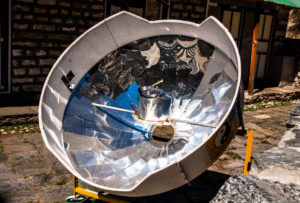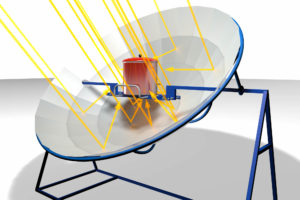Are you considering making the switch to solar cooking? If yes, then you must have come across the concept of solar ovens. So, what exactly are solar ovens, and how do they work? To put it simply, solar ovens are those that make use of the sun’s rays to cook food.
A solar cooker’s working mechanism is based on three principles: concentration, absorption, and retention.
Solar ovens are also known as solar cookers, and the terms are often used interchangeably. You’ll find that solar cookers are very common in developing countries, especially those situated in tropical areas.
In our article, we will tell you everything you need to know about a solar oven: how it works, what are its types and benefits, and so on. So, without further ado, jump right in!
Contents
- 1 Key Takeaways
- 2 How Does a Solar Oven Work?
- 3 What Are the Different Types of Solar Ovens?
- 4 What Are the Benefits of Using a Solar Oven?
- 5 How Do I Choose the Right Solar Oven?
- 6 Will a Solar Oven Work in the Winter?
- 7 Expert Insights From Our Solar Panel Installers About Solar Oven Functionality
- 8 Summing Up
Key Takeaways
- Solar ovens work based on three principles: concentration, absorption, and retention, utilizing the sun’s rays for cooking.
- There are three main types of solar ovens: Box Cookers, Panel Solar Cookers, and Parabolic Solar Cookers, each with varying cooking temperatures and purposes.
- Using a solar oven is environmentally friendly, retains food nutrients, and offers noise-free cooking, making it a versatile and sustainable cooking option.
How Does a Solar Oven Work?
 Here’s some behind-the-scenes scoop on the working mechanism of a solar cooker or solar oven:
Here’s some behind-the-scenes scoop on the working mechanism of a solar cooker or solar oven:
- First, the solar cooker’s reflecting panels will capture the sun’s UV rays and facilitate their concentration to a point. Generally, the panel tends to be made of materials like silver and chromium that have the ability to reflect or concentrate the sunlight.
- The second step is that of absorption. The concentrated solar energy needs to be absorbed. To achieve this, most solar cookers are coated with dark colors on the inside. This is done because dark colors can absorb the heat and utilize it for cooking.
Additionally, solar cookers tend to have thin surfaces to facilitate heat transfer.
- Now that the solar energy has been concentrated and absorbed, it needs to be retained. The lid of your solar cooker performs this function of retention. The cooker’s lid allows the heat to build up inside the cooker and facilitates solar cooking by retaining solar energy.
- Depending on the type of solar cooker you use, a fourth process may or may not be involved. Known as transparency, this refers to the degree of penetrability (of sunlight) that the solar cooker or oven permits.
What Are the Different Types of Solar Ovens?
Now that you know the science behind how a solar cooker works take a look at the different types of solar cookers available for use:
Box Cookers
A Box Cooker is comprised of the following parts:
- A transparent glass/ plastic top
- Reflectors made of reflective materials, like aluminum foil
- A dark-colored cooking container or cooking pot
- Insulation
Solar Box Cookers can cook food when the temperature ranges between 90-200 degrees celsius. They are the most commonly used type of solar oven across the globe. If you plan on using a box cooker, you can expect a cooking time of 1-3 hours.
Panel Solar Cookers
Here are the parts you can find in a Panel Solar Cooker:
- A reflector with a large surface area
- A cooking container
This type of solar cooker brings together the best of the box and parabolic solar cookers. Moreover, Panel Solar Cookers have the ability to perform solar cooking at temperatures as high as 284 degrees Fahrenheit.
A Panel Solar Cooker is very easy to build and can be cost-efficient even when bought. Here’s an interesting fact- refugee camps worldwide use this type of solar oven. Now, here’s a solar oven with a purpose!
Parabolic Solar Cookers
This unique solar oven comes with the following parts:
- A parabolic/paraboloidal/spherical reflector (in some cases, a Parabolic Solar Oven can also make use of vacuum tube technology)
- A cooking container
There’s a lot to marvel at about this type of solar oven. For starters, due to their efficient use of direct sunlight, a Parabolic Solar Oven can attain temperatures as high as 550 degrees Fahrenheit. You can use them for cooking literally any food.
What Are the Benefits of Using a Solar Oven?
 There are countless benefits of cooking using a solar oven. See for yourself:
There are countless benefits of cooking using a solar oven. See for yourself:
- Environment friendly, as it utilizes the renewable energy of the sun for cooking food. Considering that the cookers use direct sunlight as their fuel, there is no question of wasting fossil fuels.
- Solar cooking is a process that does not emit any of the greenhouse gases that contribute to Global Warming.
- The food cooked in a solar oven is healthier than food cooked in a traditional oven. This is because solar cooking retains the nutrients of the food which would otherwise be lost in traditional cooking methods.
- A solar oven makes cooking food an easy and simple process. The oven is also super easy to maintain!
- If you have used traditional cookers before, you know that they can make a lot of noise! However, that’s not the case with a solar oven. Rest assured, you are guaranteed a noise-free cooking experience!
- You can cook any food item or dish in a solar oven, ranging from vegetables to meat. Guess what? You can cook desserts too!
- You can also use a solar oven for other purposes, like heating leftover food, boiling water, etc.
How Do I Choose the Right Solar Oven?
While deciding on a solar oven that is right for you, there are many things you need to keep in mind. They are as follows:
- Understand your needs: Do you fry your food often? Or, are you more inclined towards baking? Once you figure this out, the chances are that you’ll find the right solar oven easily.
- Keep your location in mind: A Solar oven needs a hot and sunny climate, with high daytime temperatures. Make sure that you’re in a region where the oven can get sufficient heat energy. After all, the cooker could not possibly work without its fuel, right? Hotter the climate, the better.
- Storage: One of the biggest disadvantages of a solar cooker is its size. So, before buying one, you could make sure that you have enough space to put it away when not in use.
- Budget: While solar cookers come at very affordable rates, it would still be good to keep the budget in mind. If none of the readymade solar cookers fit your budget, you can make one yourself!
Will a Solar Oven Work in the Winter?
Yes, you can use a solar cooker to cook during winters as well. However, you will have to make the most of the occasional sunny conditions. In this regard, box cookers can prove to be the most useful because of their ability to absorb sunlight more effectively.
Expert Insights From Our Solar Panel Installers About Solar Oven Functionality
The principle of solar ovens is remarkably simple yet effective. By concentrating, absorbing, and retaining the sun’s heat, solar cookers can reach high temperatures to cook food efficiently without any fossil fuels.
Senior Solar Installer
Choosing the right type of solar oven depends on your cooking needs and environment. Box cookers are great for general use, while parabolic cookers can achieve higher temperatures, making them ideal for a wider range of cooking methods.
Lead Solar Technician
One of the significant benefits of solar ovens is their eco-friendliness. They use renewable solar energy, reduce greenhouse gas emissions, and retain food nutrients better than conventional cooking methods, making them a sustainable choice for the environment and health.
Renewable Energy Specialist
Summing Up
In this article, you discovered how do solar cookers work. You learned about the various principles that drive the working mechanism of a solar cooker. Additionally, we told you about the importance of heating and the reflective materials used to concentrate the sun’s rays.
Further, we covered the different types of solar cookers available and the parts they are comprised of. Finally, we listed the benefits of using a solar cooker and the things you need to remember before zeroing in on the one that works for you.
About the Author
Solar Panels Network USA stands at the forefront of solar energy solutions, driven by a team of seasoned solar engineers and energy consultants. With over decades of experience in delivering high-quality solar installations and maintenance, we are committed to promoting sustainable energy through customer-centric, tailored solutions. Our articles reflect this commitment, crafted collaboratively by experts to provide accurate, up-to-date insights into solar technology, ensuring our readers are well-informed and empowered in their solar energy decisions.

